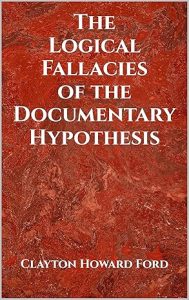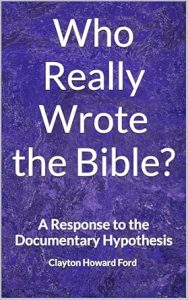From A Brief Word of Exhortation, Volume 1
Why is Jesus Called “The Word”?
Heb. 1:1-4
I want to show you how the opening of the Epistle to the Hebrews shares concepts which we find in the Gospel of John. In the process, we will find out why John called Jesus, “The Word.”
The Epistle opens with a long sentence which takes up the first four verses. The theme of the Epistle is that the new covenant is better than the old covenant, that God is doing something new and better through the new covenant.
The writer hints at this difference in these verses by stating that God has now spoken to us in a new way. Before, in the old covenant, he spoke through the prophets. Now, in the new covenant, he speaks to us through his Son.
God, in this passage, must be the Father because the passage also talks about his Son. It starts by saying that God spoke in various times and in various ways. A more literal translation is that he spoke in many parts and in many ways. God spoke to the fathers (the Jewish ancestors, the Israelites of the past) through the prophets in various ways but gave them only a part at a time. This means that no one prophet got it all. God did not reveal everything all at once. He spoke the truth a little at a time.
He spoke “by the prophets,” literally, in the prophets. The prophets did not just hear God and repeat what they heard; God was in them, speaking his words through them.
But now, in these last days, he has spoken to us by his Son. “These last days” could mean the end times, which would indicate that the end times started 2000 years ago. The Greek is literally, “at the last of these days,” possibly meaning the last days of the old covenant. The Son, Jesus, appeared during the last days of the old covenant to introduce the new covenant.
“By His Son” is literally, “in a son.” The emphasis here is not on Christ’s divinity (the writer will get to that) but his position. Not a prophet, but a son. Not many sons, but a son. This Son has the final and complete revelation.
The writer says three things about this Son:
- God spoke to us in him;
- God made the worlds through him;
- The Son is the brightness of his glory and the express image of his person.
We find all three of these concepts in the Gospel of John.
1. God spoke to us in him.
God spoke in him: God was in Christ speaking through him. Jesus says the same thing in John 14:10, “Do you not believe that I am in the Father, and the Father in Me? The words that I speak to you I do not speak on My own authority; but the Father who dwells in Me does the works.” Jesus is saying that the Father is in him and the words he speaks are not his words, but the Father’s. Jesus also repeatedly says elsewhere that he spoke only what the Father commanded him to speak (John 14:23-24; 12:48-50).
2. God made the worlds through him.
The Gospel of John says the same thing: “All things were made through Him [Jesus], and without Him nothing was made that was made” (John 1:3).
3. The Son is the brightness of his glory and the express image of his person
“Brightness,” more literally, is “shining forth.” The Son is not just bright; he is shining forth, sending out, the glory of the Father. In Christ, we can see the glory of the Father. Jesus mentions this in his prayer in John 17: “And now, O Father, glorify Me together with Yourself, with the glory which I had with You before the world was” (John 17:5). Jesus acknowledges that he had the Father’s glory.
The writer of the Epistle also says that the Son is the express image of the Father. The phrase, “express image,” in the Greek is character. This word referred to a mark or impression burned or stamped on something else, such as a coin. The image left on the coin would be an exact replica of the image on the stamp. Character was also used of the impression left in melted wax. If a king did not want anyone to read an important document without his permission, the document would be rolled up and then hot wax would be poured on it to seal it. The king would then press his ring into the hot wax. The impression left in the wax would be an exact replica of the design on the ring. What the writer of the Epistle is saying is that God took his image, his personality, his character, and impressed it upon Jesus so that Jesus is the exact image of the Father. Seeing Jesus, therefore, was the same as seeing the Father.
Jesus said the same thing about himself: “Philip said to Him, ‘Lord, show us the Father, and it is sufficient for us.’ Jesus said to him, ‘Have I been with you so long, and yet you have not known Me, Philip? He who has seen Me has seen the Father; so how can you say, “Show us the Father’’’?” (John 14:8-9).
So, the Son spoke the words of God, he created the worlds, and he is the express image of God the Father so that when you see him you see the Father. Those are also the functions of the being or force known as the Word, which is why John calls Jesus “The Word” in John 1:1.
The Greek word for “word” is logos, but logos does not mean simply “a word.” It means a collection of things. It refers first to a collection of thoughts or ideas. Hence, it also means the ability to think and to reason. Since thoughts and ideas are expressed in words, it also means a collection of words. It can mean a saying, a speech, a doctrine, or a narrative. For example, Luke writes in Acts 1:1, “The former account I made, O Theophilus, of all that Jesus began to do and teach.” The former account, of course, is the Gospel of Luke, but the word “account” in the Greek is logos. Luke refers to his entire Gospel as a logos.
By the time John wrote his Gospel, the Jews and even some of the Greek philosophers had developed the concept that the Logos was a being or a force that acted as the intermediary between God and the universe. This concept developed over a long period of time.
In 600 BC, a Greek philosopher named Heraclitus said that the Logos was the universal truth which held the universe together. He did not see the Logos as a person but he did see it as a truth which everyone should know.
In the Old Testament, the word of the Lord is sometimes seen as a force that God sends out and therefore has an existence of its own. For example, Ps. 107:20 says, “He sent his word and healed them,” as if the word itself did the healing. In Isaiah 55:10-11, the word accomplishes what the Lord sent it out to do. It departs from the Lord, accomplishes its task, and then returns to him, as if it could exist independent of him.
The Jews developed this idea that the word of the Lord existed apart from him even further after they returned from the Babylonian exile when they wrote the Targum, which is a collection of paraphrases of the Old Testament. These paraphrases would be read in the synagogues, so the people became familiar with these paraphrases as well as the Old Testament. This collection of paraphrases, the Targum, was written in Aramaic. The Aramaic word for “word” is memra. Where the Old Testament would use God’s name, the Targum would sometimes use Memra. For example, Deut. 9:3 says that the Lord is a consuming fire, but the Targum says that the Memra is a consuming fire. The Targum also says in several places that the Memra created the world. It has been argued, therefore, that Memra is simply another name for the Lord.
But there are places in the Targum where the Lord and the Memra are two separate entities. Thus, in Ex. 25:22, the Lord says to Moses that he will meet with him at the mercy seat, but in the Targum, God says, “I will order my Memra to be there.” In the Targum, the Memra also appears quite often to deliver a message from God. Thus, one of the functions of the Memra was to speak the words of God. The Memra, therefore, was not God himself nor divine but was a messenger, like one of the angels.
Interestingly, where the Old Testament says that Abram believed the Lord (Gen. 15:6), the Targum says that Abram believed the Memra. It also says that the Memra will justify Israel.
A Jewish philosopher who lived in Alexandria, Egypt, in the time of Christ and was named Philo combined these Jewish ideas about the Memra with Greek philosophy. He taught that God was separate from the universe and was therefore hidden and unknowable. He also said that the universe has always existed and is inherently evil, which is why God keeps himself separate from it. But the universe has a sense of order to it because of God’s Reason (the Logos). The Logos conceived how the universe should run and imposed that idea upon the universe. The Logos also holds the universe together and makes sure that it operates correctly. The Logos is also the mediator between God and men and can atone for sins and be man’s advocate before God. He actually describes the Logos as the paraclete, a word which the Gospel of John uses to describe both Jesus and the Holy Spirit. It means “one who is called alongside to help” and is translated as “comforter” or “advocate.” The Logos is also God’s envoy to man, meaning that the Logos reveals the unknowable God to men. Philo also refers to the Logos as the firstborn of God.
By stating that Jesus is the Logos, John was saying that Jesus is all of this and more. He did not have to explain what he meant to his readers because he knew that these ideas were already well known to them.
Because he is the Logos, Jesus spoke the words of the Father. And because he is the Logos, he created the worlds. But, unlike the Memra, he is not a being who is less than divine. He, too, is God, just as much as the Father is. And because he is God, because he has been with the Father from eternity and therefore knows the Father intimately, because he has the character of the Father impressed on him, because he is in the Father and the Father is in him, he can accurately represent the Father and accurately reveal to us the Father, who is otherwise hidden from us: “No one has seen God at any time. The only begotten Son, who is in the bosom of the Father, He has declared him” (John 1:18). Notice that Jesus “declared him,” that is, he did not just show us who the Father is; he also used words to tell us who the Father is.
Jesus spoke the words of the Father, the Father created the world through him, and Jesus revealed the Father to us and showed us his glory. Those are the functions of the Logos, which is why John calls Jesus the Word, the Logos.
The writer of Hebrews is saying that because God has changed how he speaks to us, not through more prophets, but through the Son who created the worlds and is the express image of the Father, the old way of doing things, the old covenant, has been done away and a new way of doing things, a new covenant, has been implemented. He ends verse 4 by saying that Jesus is better than the angels. He will spend the rest of chapter 1 proving that statement and then, in chapter 2, he will tell us why that is important.








